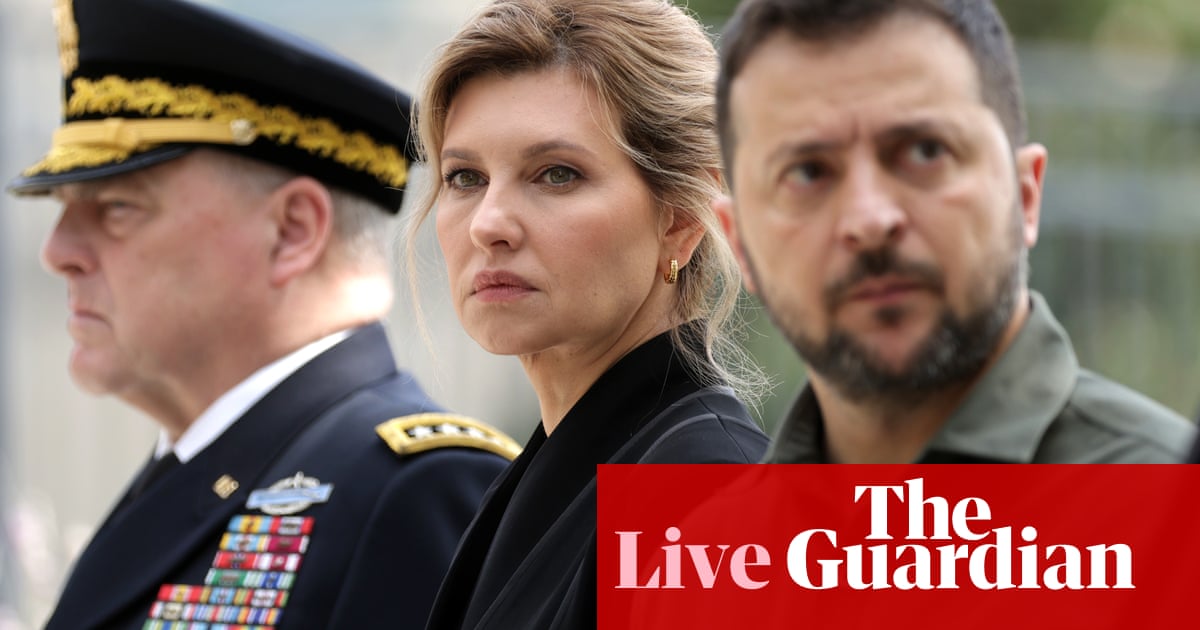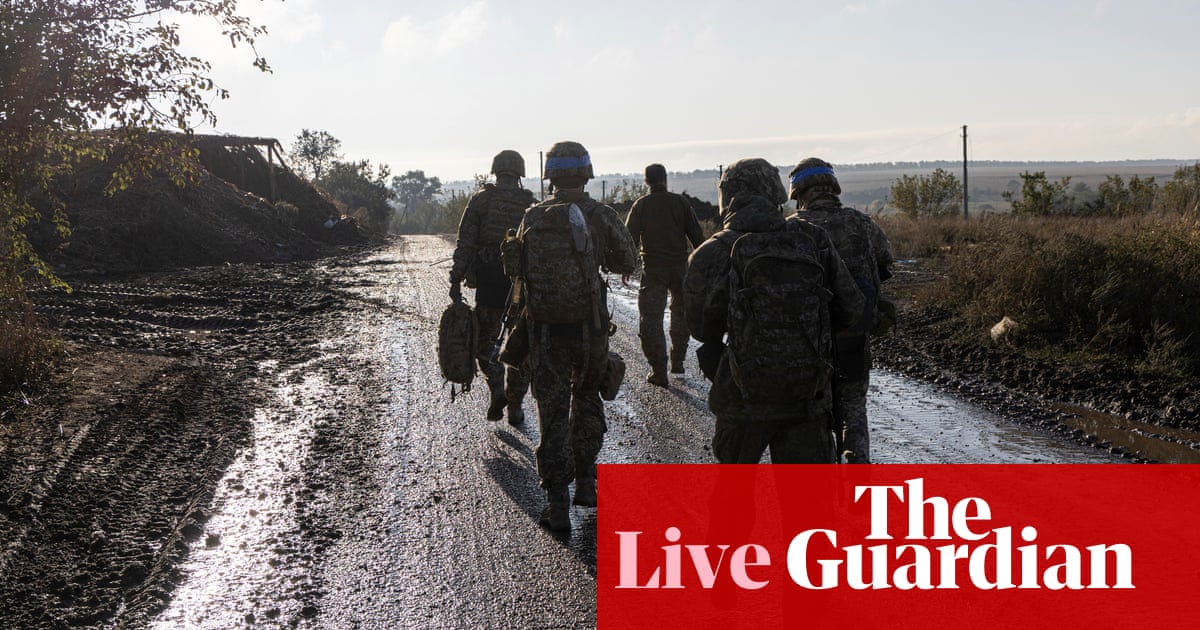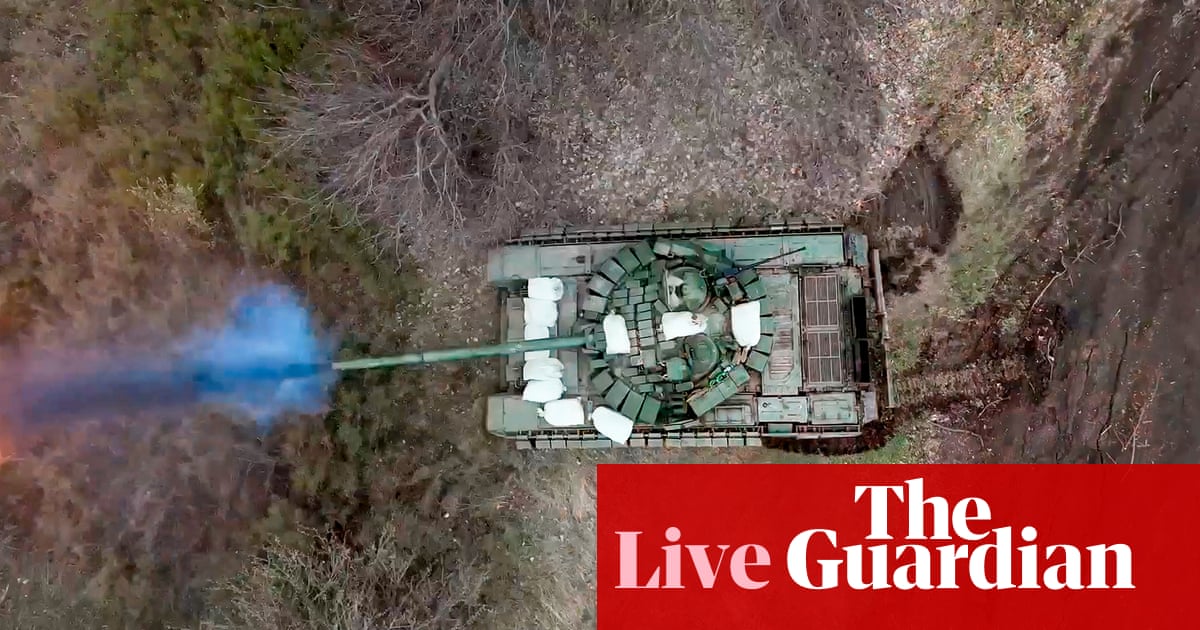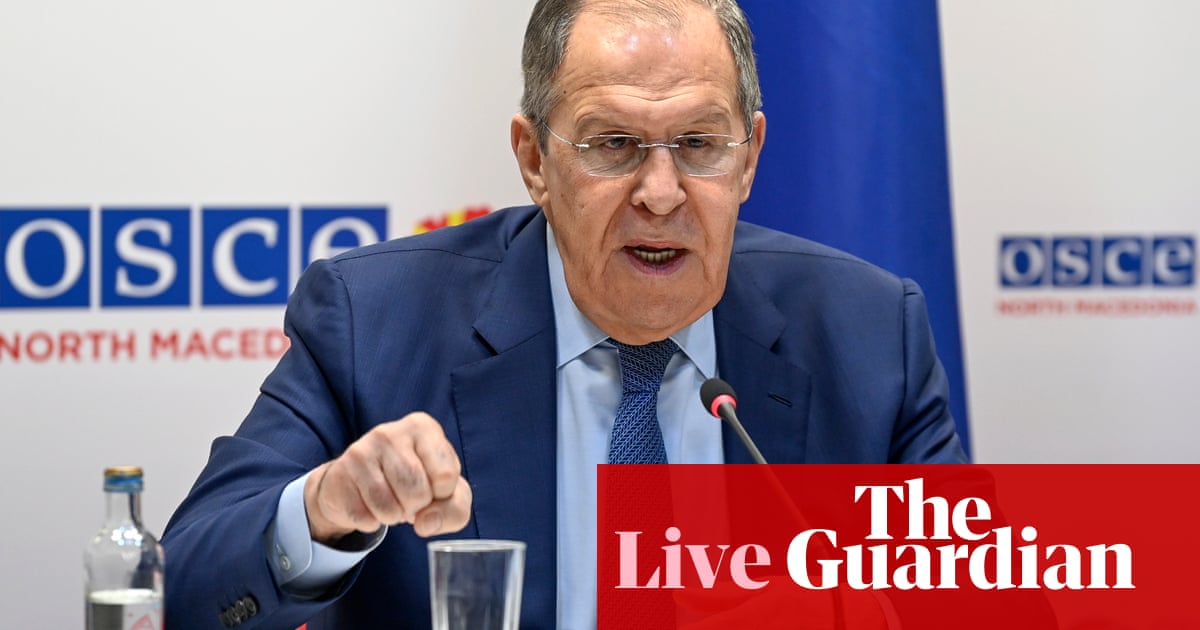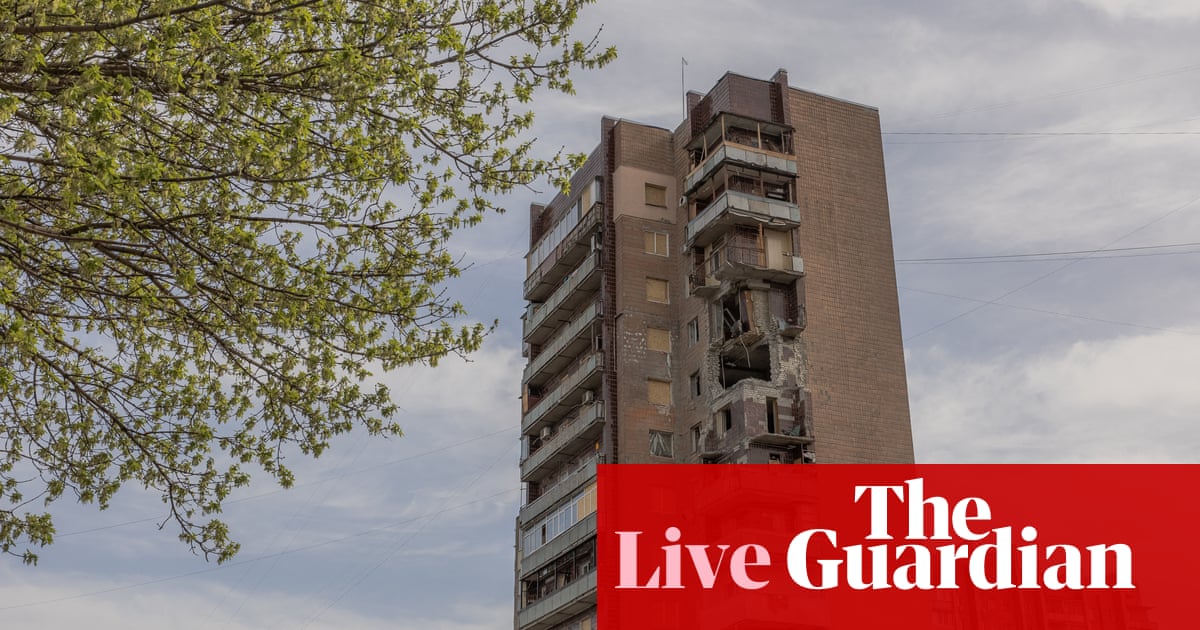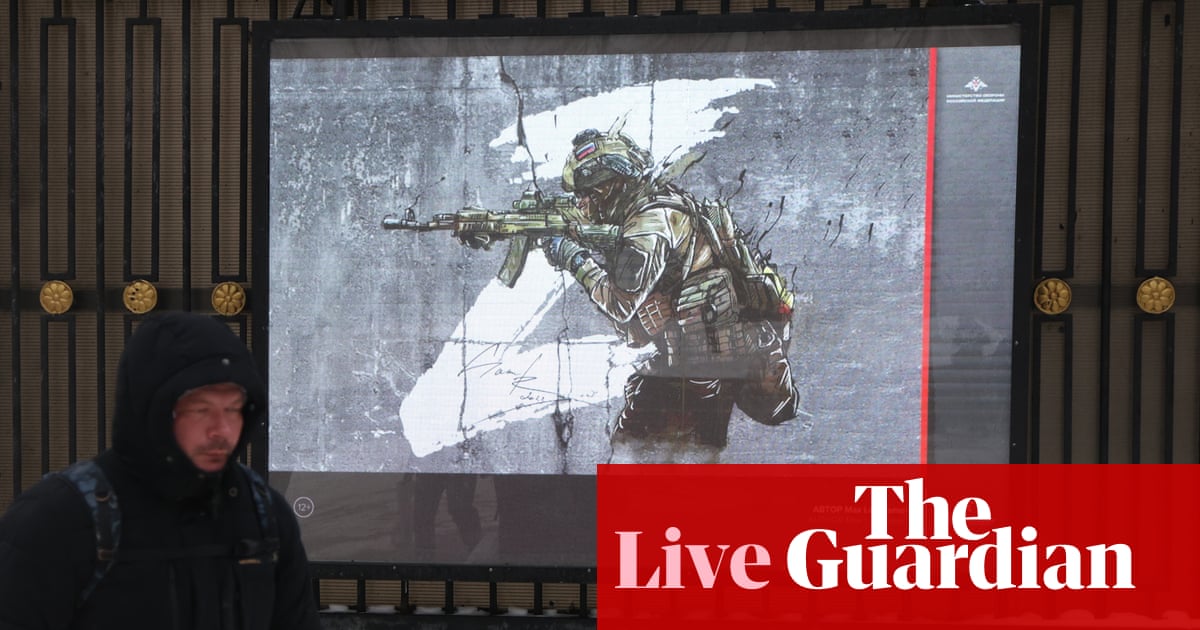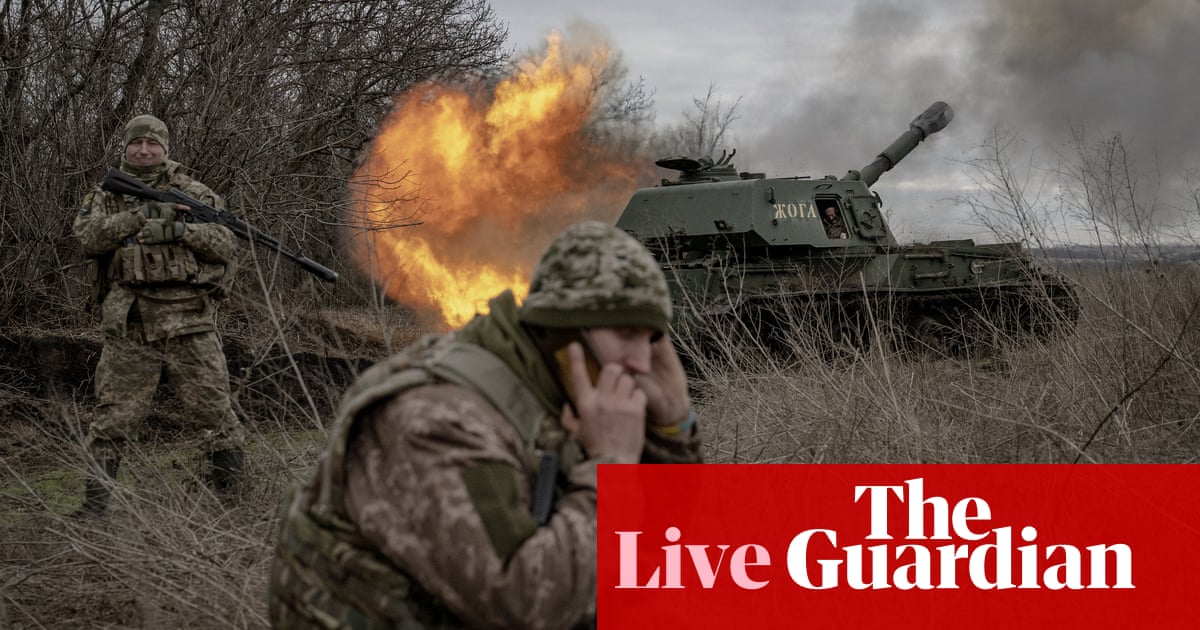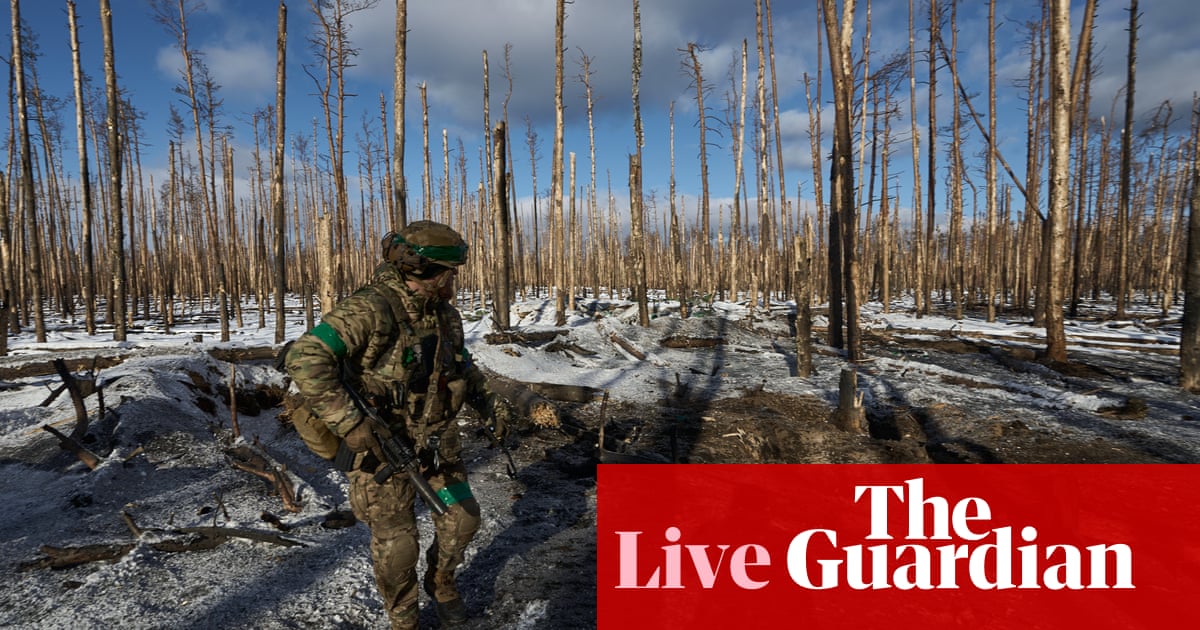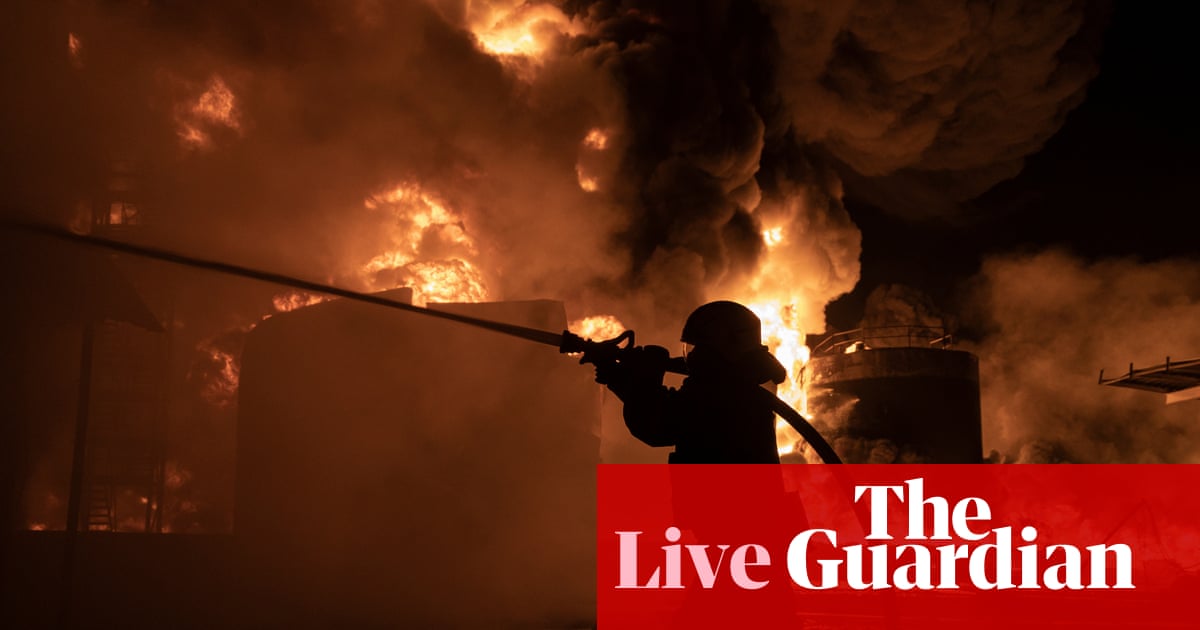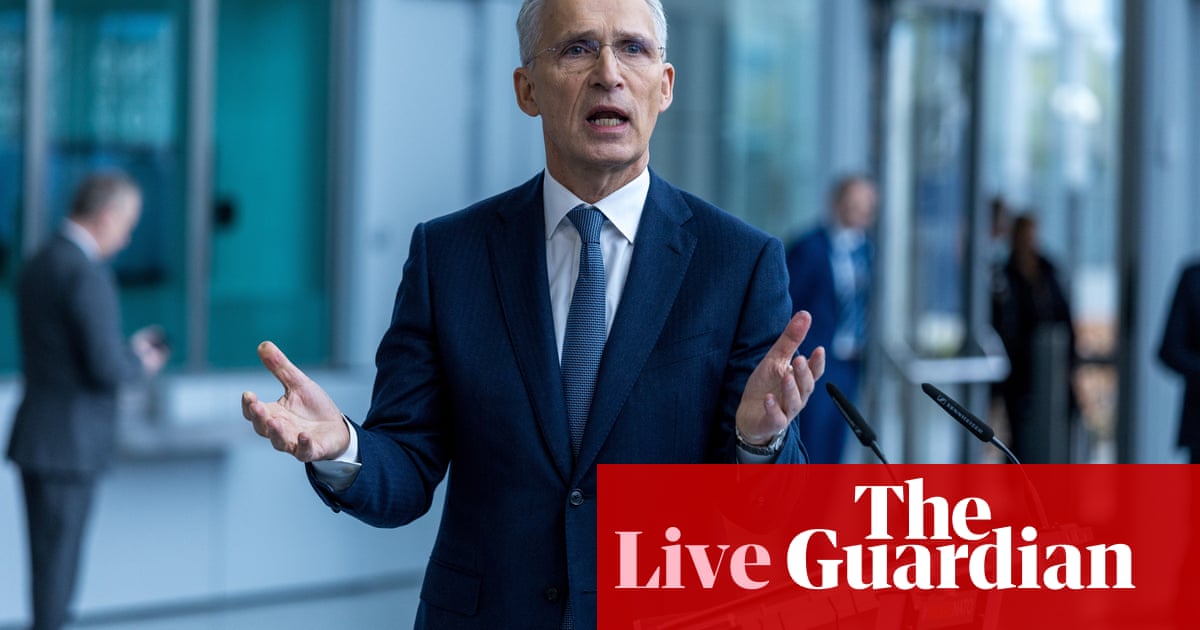
Nato ministers agree to plan for greater alliance role in coordinating Ukraine aid, Stoltenberg says
“Today, allies have agreed to move forward with planning for a greater Nato role in coordinating security assistance and training. The details will take shape in the weeks to come,” Jens Stoltenberg, the Nato secretary-general, said after today’s talks at Nato headquarters in Brussels.
Asked about the proposal, Stoltenberg declined to go into details but said that he has discussed it with senior Ukrainian leaders and that there are different ways of ensuring that support is less dependent on voluntary short-term offers.
“We are in dialogue with Ukraine on this because this is actually something that we should do together,” he said, noting that no decisions have been taken today.
Summary of the day
Nato foreign ministers met in Brussels.
Jens Stoltenberg, the alliance’s secretary-general, announced that when it comes to the future of aid to Ukraine, “today, allies have agreed to move forward with planning for a greater Nato role in coordinating security assistance and training.”
Asked about a possible €100bn Nato fund for Ukraine, the Polish foreign minister, Radek Sikorski, told reporters: “we support the secretary-general’s efforts.”
The German foreign minister, Annalena Baerbock, said “it is essential that we pour the ad-hoc structures into reliable, long-term structures.”
The British foreign secretary, David Cameron, urged allies to boost defence spending. “The most important thing we can do to make sure this alliance continues to grow and continues to strengthen is to ensure that we all spend over 2% of our GDP on defence,” he said.
The Ukrainian president, Volodymyr Zelenskiy, reiterated his call for more air defences. “This terror is wreaking havoc on cities and villages throughout Ukraine, and Russia is particularly relentless in bombarding frontline and border areas,” he wrote.
Ukraine’s partners are not providing Ukraine with enough air defence, the country’s foreign minister, Dmytro Kuleba, told Reuters in an interview.
Russian security official Nikolai Patrushev said today, without providing any evidence, that “Ukrainian special services” were behind last month’s deadly concert shooting near Moscow.
Two Russian TU-95MS strategic bomber planes performed a scheduled five-hour flight over neutral waters of the Barents and Norwegian seas.
Asked about concerns raised by Hungary, Jens Stoltenberg insisted that the alliance will remain defensive in nature and noted that he has spoken with the Hungarian prime minister, Viktor Orbán, twice in the last week.
Nato ministers agree to plan for greater alliance role in coordinating Ukraine aid, Stoltenberg says
“Today, allies have agreed to move forward with planning for a greater Nato role in coordinating security assistance and training. The details will take shape in the weeks to come,” Jens Stoltenberg, the Nato secretary-general, said after today’s talks at Nato headquarters in Brussels.
Asked about the proposal, Stoltenberg declined to go into details but said that he has discussed it with senior Ukrainian leaders and that there are different ways of ensuring that support is less dependent on voluntary short-term offers.
“We are in dialogue with Ukraine on this because this is actually something that we should do together,” he said, noting that no decisions have been taken today.
Jens Stoltenberg, the Nato secretary-general, is addressing reporters after the first day of talks among the alliance’s foreign ministers.
“The Ukrainians are not running out of courage, they’re running out of ammunition. We need to step up now to ensure our support is built to last,” he said.
And here’s the first Nato ministers’ family photo with Sweden as a member.
Two Russian TU-95MS strategic bomber planes performed a scheduled five-hour flight over neutral waters of the Barents and Norwegian seas, the Russian defence ministry said today, Reuters reported.
“At certain stages of the route, the strategic missile carriers were escorted by fighter jets of foreign countries,” the ministry said without naming the countries involved.
Ukraine has thanked Finland for its latest military aid package.
"It’s just an issue of political will": Ukrainian minister calls for more air defences
Ukraine’s partners are not providing Ukraine with enough air defence, the country’s foreign minister, Dmytro Kuleba, told Reuters in an interview today.
“Partners did provide us with their different (air defence) systems, we appreciate that, but it’s just simply insufficient, given the scale of the war,” Kuleba said.
“The solution is there. It’s just an issue of political will. So someone has to make the decision,” the minister said.
He added:
The best way to save your Patriots from intercepting missiles (over your countries) and your soldiers from dying is to send your Patriots to Ukraine and give Ukrainian soldiers everything they need.
German foreign minister calls for "long-term structures" for Ukraine aid
The German foreign minister, Annalena Baerbock, said today that it was essential that Kyiv’s allies build up reliable structures so future aid can get to Ukraine, Reuters reported.
“For us, it is essential that we pour the ad-hoc structures into reliable, long-term structures,” she said.
Ukraine and Finland sign security agreement
The Finnish president, Alexander Stubb, and the Ukrainian president, Volodymyr Zelenskiy, signed an agreement today on security cooperation and long-term support.
The Ukrainian foreign minister, Dmytro Kuleba, who is in Brussels for the Nato foreign ministers’ meeting, said he met with his Danish counterpart, Lars Løkke Rasmussen.
“We discussed Ukraine’s priority needs in military aid, particularly air defense systems and missiles. I am also pleased that Denmark is working on a new military aid package to bolster our defense,” he said.
Asked about a possible €100bn Nato fund for Ukraine, the Polish foreign minister, Radek Sikorski, told reporters: “we support the secretary-general’s efforts.”
Nato has returned to a Cold War mindset, Russia’s foreign ministry said today.
“Today, in relations with Russia, the bloc has returned to Cold War settings,” foreign ministry spokeswoman Maria Zakharova told reporters, Reuters reported.
She said the alliance has no place in a “multipolar world”.
Mélanie Joly, the Canadian foreign minister, said when arriving at Nato HQ that “Putin thought that he would divide us; now we’re stronger than ever.”
“We know also we have to continue to invest in supporting militarily and at all levels Ukraine,” she said.
Cameron says all countries should "spend over 2%" of GDP on defence
Arriving at the Nato ministers’ meeting, the British foreign secretary, David Cameron, urged allies to boost defence spending.
“The most important thing we can do to make sure this alliance continues to grow and continues to strengthen is to ensure that we all spend over 2% of our GDP on defence. Many more countries are now doing that, but we need every country to do that.
Frankly, that’s the best thing we can do to make sure the Nato summit in Washington this summer is a success, and it’s also the best way to prepare for the American elections in the autumn, whatever their outcome may be.”
‘No choice’: Ukraine eyes Kerch bridge in Crimea for drone attack
They have become a familiar sight in the skies above parts of Russia: long-range enemy drones, buzzing their way to another target.
In the biggest Ukrainian onslaught inside Russian territory since Vladimir Putin’s full-scale invasion two years ago, Ukraine has in recent weeks carried out a series of attacks on Russian oil refineries and ports. On Tuesday, it hit a refinery and drone factory in the industrial region of Tatarstan - more than 800 miles from the border.
The Ukrainian spy agency behind these drone strikes has its eyes on another target: the 12-mile long Kerch bridge connecting occupied Crimea with Russia.
Senior officials from Ukraine’s HUR military intelligence service indicate it is plotting a third attempt on the bridge, after two previous attempts to blow it up, claiming its destruction is “inevitable”.
For Putin, the bridge is a tangible reminder of what he sees as one of his greatest political achievements: the peninsula’s 2014 “return” to Russia using undercover Russian troops and a sham referendum.
For Kyiv, the bridge is equally a hated symbol of the Kremlin’s illegal annexation. Its destruction would strengthen Ukraine’s campaign to liberate Crimea and raise morale on and off the battlefield, where Kyiv’s forces are gradually being pushed back.
Asked about Stoltenberg’s proposal for a multiyear Nato aid package for Ukraine, another senior European diplomat told us:
Allied support to Ukraine is a fraction of the resources needed for deterrence and defence of North Atlantic area and yet the successful defence of Ukraine greatly impacts the overall cost of Nato’s defence.
Serious long-term support of Ukraine requires predictable, equitable and robust allocation of resources.
Nato countries shared the burden of war in Afghanistan in comparable terms for nearly 20 years and our economies are able to generate adequate resources. Let’s hope we will find enough political will and courage to do that on the way to Washington summit.
Nato chief pitches "predictable" aid to Ukraine as "multiyear" package floated
Arriving for the Nato ministers’ meeting this morning, Jens Stoltenberg, the alliance’s secretary-general, made the case for changing how aid is channeled to Ukraine.
He said officials will now discuss how Nato could take on more responsibility for coordinating military equipment for Kyiv and that ministers will discuss a multiyear package.
Nato as an organisation had originally stayed away from direct lethal military assistance to Kyiv, as a US-led contact group led coordination efforts.
“Ukraine has urgent needs – any delay in providing support has consequences on the battlefield as we speak,” the Nato chief said. “So we need to shift the dynamics of our support.”
Stoltenberg added:
We must ensure reliable and predictable security assistance to Ukraine for long haul so that we rely less on voluntary contributions and more on NATO commitments, less on short term offers and more on multiyear pledges.
Therefore, ministers will discuss how NATO could assume more responsibility for coordinating military equipment and training for Ukraine, anchoring this within a robust NATO framework. We will also discuss a multiyear financial commitment to sustain our support.
This ministerial will set the stage for achieving consensus on these issues as we prepare for the Washington summit.
NATO allies provide 99% of all military support to Ukraine.
So doing more under Nato would make our efforts more efficient and more effective.
Asked about his proposal, Stoltenberg declined to go into details but said allies are discussing how to institutionalise support within the Nato framework and how to make it more predictable.
Nato’s secretary-general, Jens Stoltenberg, has proposed a 100 billion euro, five-year military aid package for Ukraine.
Asked about the proposal, one senior European diplomat told the Guardian:
“100 bn for 5 years looks pretty big, but it is a small effort we have to pay in order for Ukraine to win. Otherwise, the price will be much much higher, I assure you.”
The diplomat added: “We haven’t yet figured it out how we build this 100 bn for 5 years. We could get to a solution that would also include the bilateral contributions to Ukraine, which could then be bearable for every one.”
Russian security official Nikolai Patrushev said today, without providing any evidence, that that “Ukrainian special services” were behind last month’s deadly concert shooting near Moscow and that Ukraine was under the control of the United States, Reuters reported citing state media.
Ukraine has denied any involvement in the attack.
Ukraine has shot down four drones overnight, the country’s military said.
“On the night of April 3, 2024, the enemy attacked the Donetsk region with three S-300 anti-aircraft guided missiles and launched 4 Shahed-136/131 UAVs from the Primorsko-Akhtarsk area of the Russian Federation,” the Ukrainian air force said, Ukrinform reported.
Zelenskiy calls for "reliable air defense systems capable of saving lives"
As Nato ministers prepare to meet in Brussels later today, the Ukrainian president, Volodymyr Zelenskiy, has reiterated his call for more air defences.
“This terror is wreaking havoc on cities and villages throughout Ukraine, and Russia is particularly relentless in bombarding frontline and border areas,” he wrote.
“None of this will be possible when Ukraine receives reliable air defense systems capable of saving lives and restoring security to our cities. ‘Patriots’ in the hands of Ukrainians have demonstrated that all forms of Russian terror can be defeated,” he said.
Ukraine expects significant electricity exports to rebound today, but the volumes are still well below levels prior to Russia’s recent missile attacks, Ukraine’s energy ministry said, Reuters reported.
11-year old dies in Kharkiv region
Oleg Sinegubov, head of the Kharkiv regional military administration, said this morning on Telegram that an 11-year old boy died in hospital after sustaining injuries in an attack in the region.
His 58-year-old father was killed yesterday, Sinegubov said.
Cameron calls for more investment in defence as Nato ministers meet
Nato foreign ministers will meet in Brussels today. David Cameron, the British foreign secretary, is set to urge his colleagues to spend more, produce more and deliver more on defence.
In a speech, Cameron is expected to encourage Nato allies to step up support for Kyiv and ramp up defence industrial production.
“75 years after its creation, we are celebrating a Nato that has never been stronger or more important, especially following Sweden’s accession last month,” Cameron said.
“With Ukraine closer to Nato than ever, we must sustain the critical support Ukraine needs to win the war,” the foreign secretary stressed, adding that “Allies need to step up and spend more on defence in the face of continued Russian aggression and a more dangerous world.”




